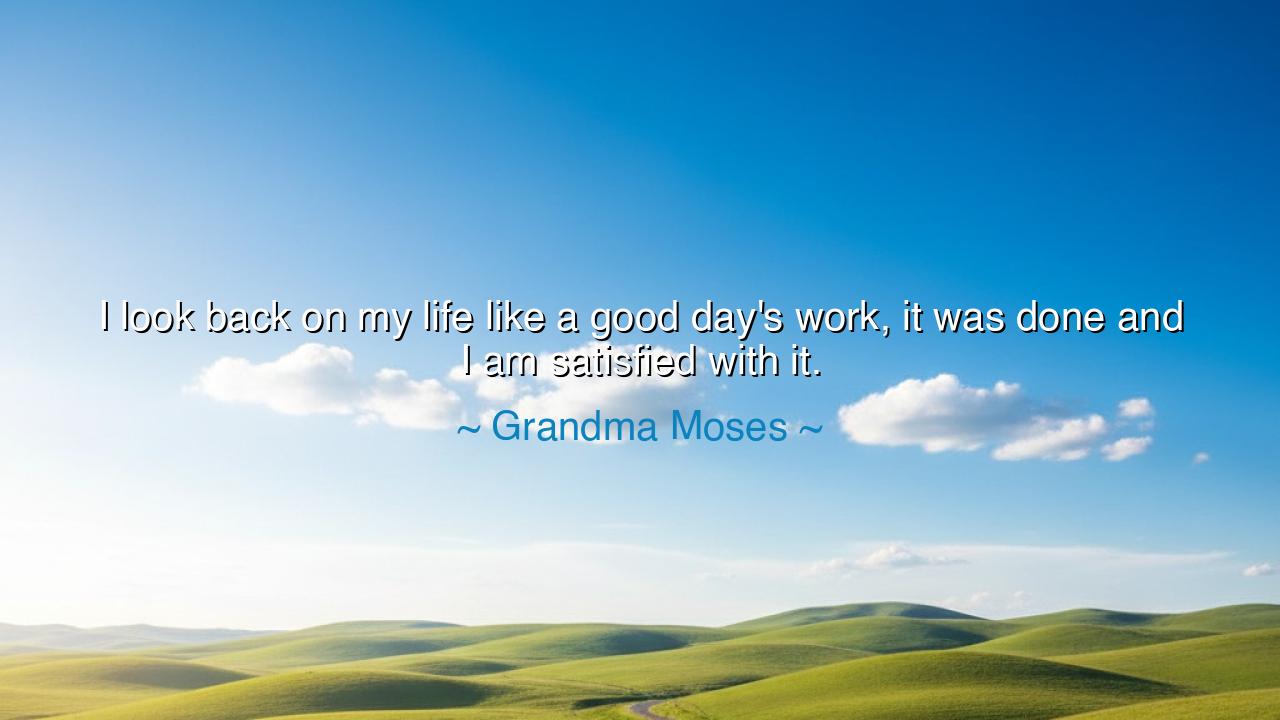
I look back on my life like a good day's work, it was done and I






In the quiet light of her later years, Grandma Moses, the beloved American folk artist, once said: “I look back on my life like a good day’s work, it was done and I am satisfied with it.” These words, humble yet profound, carry the serene wisdom of a soul that labored not for fame or fortune, but for meaning. To view one’s life as a day’s work is to see it as an honest effort, marked by diligence, purpose, and grace. It is to understand that life need not be grand to be good, nor perfect to be fulfilled. For Grandma Moses, satisfaction did not come from ease or abundance — it came from the steady rhythm of living fully, loving deeply, and doing what she could with what she had.
The origin of this quote lies in the life of Anna Mary Robertson Moses — known to the world as Grandma Moses. Born in 1860 in rural New York, she spent most of her life as a farmer’s wife and mother, working the land and raising ten children, only five of whom survived infancy. She began painting in her seventies, when age and arthritis made farm work impossible. Yet instead of lamenting the years behind her, she turned to art with the same spirit she had brought to her fields — patient, persistent, unpretentious. By painting the simple beauty of country life, she transformed her memories into masterpieces, showing the world that it is never too late to create, to contribute, to begin again. Her words, spoken near the end of her journey, are the reflection of one who lived with contentment, not regret.
To say, “It was done and I am satisfied,” is not the voice of pride, but of peace. It is the song of a worker who has given her best and asks for nothing more. In a world obsessed with achievement, Grandma Moses reminds us that satisfaction does not come from applause or recognition, but from knowing that one’s effort was sincere. She teaches that fulfillment is born not in the moments of glory, but in the daily toil — the quiet hours when no one watches, the steadfast hands that build, mend, and nurture. Life, she tells us, is not a race to greatness, but a craft, shaped one humble act at a time.
Consider the life of George Washington Carver, another soul who, like Grandma Moses, found holiness in ordinary work. Born into slavery, he rose to become one of America’s greatest scientists and educators. Yet his true genius was not in invention alone, but in his reverence for the small and simple. “Anything will give up its secrets if you love it enough,” he said, and through his love for the earth, he lifted countless lives. Like Grandma Moses, when Carver looked back on his life, it was not wealth or fame he saw, but service — the patient devotion to purpose that leaves the soul in harmony with itself.
Grandma Moses’s philosophy is, at its core, a hymn to perseverance. She did not measure her life by its difficulties, though she knew many, but by its blessings. She saw beauty in the everyday — in the fields she worked, the snow she shoveled, the hands that aged as they served. She painted what she knew: a world of labor, laughter, and love. And when her work was done, she could look back, as she said, “like a good day’s work” — weary, perhaps, but content, for the day had been well spent.
This is the wisdom we must carry forward: that contentment is the harvest of effort. Those who live chasing perfection die unsatisfied; those who live giving their best, rest in peace. A good life, like a good day’s work, is not free from sweat or failure. It is simply one in which we have shown up — with honesty, with hope, and with heart.
So, my children, remember this: work each day as though it were your masterpiece. Do not wait for tomorrow to begin your art, your kindness, your contribution. Do not measure your worth by how far you travel, but by the sincerity of your step. Live simply, love what you do, and when the sun of your days sets, may you, too, look back and say, “It was done — and I am satisfied.”
For in the end, the greatest success is not in how much we accomplish, but in how deeply we have lived. As Grandma Moses showed the world, a full life is not measured in years, but in contentment — the quiet joy of knowing you have lived, labored, and loved as best you could. And that, truly, is the mark of a good day’s work.






AAdministratorAdministrator
Welcome, honored guests. Please leave a comment, we will respond soon